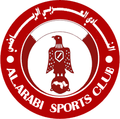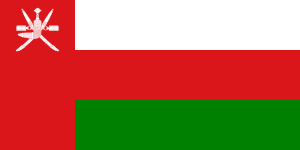Al-Arabi SC (Qatar)
 | |||
| Full name | Al-Arabi Sports Club (Arabic: النادي العربي الرياضي) | ||
|---|---|---|---|
| Nickname(s) | "Fareeg Al-Ahlam" ("The Dream Team") , "The Red Devils" , "Century Club in Qatar" | ||
| Short name | ARB | ||
| Founded | 1952 | ||
| Ground |
Grand Hamad Stadium Doha, Qatar | ||
| Capacity | 13,000 | ||
| President |
| ||
| Head Coach | Gianfranco Zola | ||
| League | Qatar Stars League | ||
| 2014–15 | Qatar Stars League, 8th | ||
| Website | Club home page | ||
|
| |||
| Al Arabi's active sections | ||
|---|---|---|
Football |
Basketball |
Handball |
Volleyball |
Futsal |
Reserves |
Al-Arabi Sports Club (Arabic: النادي العربي الرياضي), is a Qatari sports club based in Doha, Qatar. Founded in 1952, the most prominent team of the club is the football team which plays in the Qatar Stars League.[1] The club's home ground is the 13,000-seat Grand Hamad Stadium, where they have played since their establishment.
Al-Arabi had their first major success in 1978, winning the Emir of Qatar Cup, and won various titles during the 1980s and 1990s. The club enjoyed their greatest period of success in those two decades, winning 17 major trophies. Domestically, Al-Arabi have won seven league titles, eight Emir of Qatar Cups, one Qatar Crown Prince Cup and six Qatar Sheikh Jassem Cups.
Al-Arabi's regular kit colours are red shirts and shorts with red socks. The club's crest has been changed several times in attempts to re-brand the club and modernise its image. The current crest, featuring a ceremonial falcon, is a modification of the one introduced in the early 1950s. They are known for having one of the largest fan bases in Qatar next to rivals Al Rayyan. In terms of championships won, they are the second most successful club on a local level after Al Sadd. Al-Arabi is known by various nicknames including "Dream Team", "The Red Devils", and "Century Club".
History
Foundation (1952–1990)
The club was founded in 1952 under the name "Al-Tahrir", making them the second oldest team in Qatar. In 1957, the club merged with Al-Wehda, a club founded which was founded on that year led by Mohamed Ali Ahmed Al-Ansari, after playing a friendly. They merged under the name of Al-Wehda. Al-Wehda did not play out Qatar or host any foreign clubs due to lack of financial possibilities for the club. In 1972, the club integrated under their current name, Al Arabi.[2] The first president of the club was Ahmed Ali Ahmed Al-Ansari.
Al-Arabi was known for having one of the largest fan bases in all of Qatar, as well as other Gulf states, and was well-known overseas. Their popularity outside of the Middle East was bolstered by their achievements and national team players, until 2003 when it reached its peak with the signing of Argentine legend Gabriel Batistuta.
It came in 14th place in International Federation of Football History & Statistics's 1901–2000 Asian Club of the Century, the highest from Qatar.
Founders
Golden era (1990–2000)
The 1990s marked the start of a continuous chain of succession for Al-Arabi. The dream team had come to fruition with the likes of Marco Antônio and Richard Owebukeri who were the top scorers in the league at one point. Perhaps the most significant player was Mubarak Mustafa, who is still considered one of the best Qatari footballers in history. The team, impressing many with its versatile squad, took the Qatari league by storm, winning it 5 times out of 10. Not satisfied merely with local success, the team achieved runners-up position in the AFC Champions League in 1995.
They won their first Heir Apparent cup in 1997.
Decline (2000–2011)
The new century saw a significant slump in Al-Arabi's performance. Factors which impacted this may include the departure of Mubarak Mustafa and the increase of competitiveness from local clubs. In the 2002 season, Al Arabi finished in 7th place, the lowest position since its debut in the Qatar Stars League.
The arrival of Gabriel Batistuta in 2003 saw a glimpse of hope for Al-Arabi as they finished significantly higher in the league than the last 2 previous seasons, however they ended up finished 9th in the league at the end of the 2007 season, a new low. They did not win a single domestic title during this period, and had limited success in international competitions. Furthermore, they suffered their largest-ever defeat against Al Sadd that season when they were beaten 7–0, which resulted in the sacking of their coach Cabralzinho.[3]
In 2006, due to popular dissent accosting the club president Sheikh Falah bin Jassim, there was an administration change which resulted in Sheikh Faisal bin Mubarak being elected as president.
Management crisis (2011–present)
The beginning of the 2011–12 season looked bright for Al Arabi, with the club winning their first domestic silverware in 13 years by defeating Umm Salal SC in the final of the 2011 Sheikh Jassem Cup. However, a string of bad results in the league resulted in the sacking of their coach, Paulo Silas.
They were also eligible to play in the 2012 AFC Champions League, which they were the first team to be eliminated from. During this period, the club had been in charge of 3 coaches in a span of 3 months. They infamously made history by being the first team since 2007 to lose every match in the group stage, as well as the first Qatari team to achieve this.[4] As a result, the club's Director of Football, Mubarak Mustafa, announced his departure from the club.[5] Furthermore, Dr. Abdullah al-Mal, president of the club, announced his retirement from sports.[6] He was replaced by Hitme Bin Ali Al Hitmi. The fiscal budget of the club was reduced from 15 million riyals to 9 million riyals.[7]
The title of Dream Team
Al Arabi Club called by the nickname " Dream Team ", an old launched by the local press in the season title (1992/1993) proportions team American dreams of basketball where the team has achieved in the early nineties all titles and was the win significant results of all the teams at least three goals in every game.
Most notably Matches at that time, win 6–1 against Al Rayyan, Win 9–0 against Al itthad ( Al Gharafa), and win 6–0 against Al Ahli.
Al Arabi Fans Club
Al Arabi Fans Club was established on October 21, 2015, it was created to support the team in all Sports and to gather the fans to think of innovative ways to support and cheer the teams throughout the season [8] in October 21, 2015, The same day the Fan Club was established, Al Arabi Club management decided to withhold the Number (1) jersey permanently from the list of the first team players and award it to the Fans, whom officially became the number (1) player in Al Arabi Club, Where Captain Masoud Zeraei waived his number (1) and awarded it to the Fans, who will retains its permanently under resolution.
Stadium

Grand Hamad Stadium (Arabic: استاد حمد الكبير), also known as the Al-Arabi Sports Club Stadium, is a multi-purpose stadium in Doha, Qatar. It is currently used mostly for football matches. The football team Al-Arabi SC play there. The stadium holds 13,000 people. The stadium was used extensively during the 2006 Asian Games, and was a venue for several different sports; these include football, table tennis, rugby sevens and fencing. Iraq national football team played their 2014 FIFA World Cup qualification (AFC) games at the ground. Now they use the Stadium as a home for Yemen national football team in 2015 Fifa World qualification (AFC).
Rivalries
Al Rayyan
Al Rayyan and Al Arabi are often the most considered the most passionate sets of fans in Qatar. This derby known as "Fans Derby".
Head-to-head
From 1994–2015.
| Head-to-head | |||||||||
|---|---|---|---|---|---|---|---|---|---|
| Competition | P | W | D | L | GF | GA | GD | ||
| Qatar Stars League | 46 | 11 | 16 | 19 | 62 | 82 | −20 | ||
| Sheikh Jassem Cup | 4 | 3 | 1 | 0 | 8 | 2 | +6 | ||
| Emir Cup | 5 | 1 | 1 | 3 | 5 | 7 | −2 | ||
| Crown Prince Cup | 7 | 1 | 1 | 5 | 6 | 16 | −10 | ||
| Reserve League | 4 | 1 | 1 | 2 | 11 | 13 | −2 | ||
| Qatar Stars Cup | 1 | 0 | 0 | 1 | 0 | 2 | −2 | ||
| Total | 67 | 17 | 20 | 30 | 92 | 122 | −30 | ||
Al Sadd
This is the clash of Qatar's two most successful teams: Al Sadd and Al Arabi. For some fans, winning this derby is more noteworthy than winning the league itself. The derby is an important component of the country's culture.[9]
Al Arabi always regarded themselves as the club of Qatar's working class, in contrast with the more upper-class support base of Al Sadd. The social class divide between the two fan bases eventually diminished.[9]
Memorable matches
Bold indicates a win.
| Season |
Result | Competition |
Notes |
|---|---|---|---|
| 1981–82 | 0–1 | Emir Cup | |
| 1985–86 | 1–0 | Emir Cup | |
| 1992–93 | 2–0 | Emir Cup | |
| 1995–96 | 0–0 | Qatar Stars League | Al Arabi crowned champions. |
| 2009–10 | 3–3 | Qatar Stars League | Al Sadd come back from 3–0 down to deny Al Arabi an ACL spot. |
Head-to-head
From 1996–2015.
| Head-to-head | |||||||||
|---|---|---|---|---|---|---|---|---|---|
| Competition | P | W | D | L | GF | GA | GD | ||
| Qatar Stars League | 46 | 13 | 12 | 21 | 51 | 78 | −27 | ||
| Sheikh Jassem Cup | 6 | 1 | 0 | 5 | 8 | 13 | −5 | ||
| Emir Cup | 11 | 3 | 2 | 6 | 11 | 18 | −7 | ||
| Crown Prince Cup | 1 | 1 | 0 | 1 | 3 | 3 | 0 | ||
| Reserve League | 4 | 0 | 2 | 2 | 4 | 10 | −6 | ||
| Qatar Stars Cup | 4 | 1 | 2 | 1 | 8 | 12 | −4 | ||
| Total | 73 | 19 | 18 | 36 | 85 | 134 | −49 | ||
Crest
-

Al Arabi's crest, late 1900s through early 2000s -

Al Arabi's crest, present
Honours
23 official championships.
- Domestic competitions
- Winners (8): 1978, 1979, 1980, 1983, 1984, 1989, 1990, 1993
- Winners (1): 1997
- Winners (6): 1980, 1982, 1994, 2008, 2010, 2011
- Winners (1): 2010
- Regional competitions
- Ittihad Cup
- Winners (5): 1982, 1983, 1989, 1990, 1997
- Qatar Insurance Cup
- Winner (1): 1993
- Friendship Tournament
- Winners (2): 1986, 1996
League results

Performance in AFC competitions
- Asian Club Championship: 5 appearances
- Asian Cup Winners' Cup: 2 appearances
- AFC Champions League: 1 appearance
- 2012: Group Stage
Performance in UAFA competitions
- Gulf Club Champions Cup: 7 appearances
Players
As of Qatar Stars League:
|
| ||||||||||||||||||||||||||||||||||||||||||||||||||||||||||||||||||||||||||||||||||||||||||||||||||||||||||||||||||||||||||||||||||||||||||||||||||||||||||||||||||||||||||||||||||
Out on loan
| ||||||||||||||||||||||||||||||||||||||
Players with Multiple Nationalities
-

 Masoud Zeraei
Masoud Zeraei -

 Mosaab Mahmoud
Mosaab Mahmoud -

 Dame Traoré
Dame Traoré -

 Ahmed Fatehi
Ahmed Fatehi -

 Abdullah Al-Oraimi
Abdullah Al-Oraimi -

 Boualem Khoukhi
Boualem Khoukhi -

 Yusef Ahmed
Yusef Ahmed
Players registered as professionals
QSL clubs are limited to 4 foreign professionals (3 + 1 Asian) per squad.[10]
Last update: 20 August 2014.[11]
|
Professional players |
Non-professional foreigners
|
Club staff
- Technical and administrative staff
Last updated: July 2015.
|
| ||||||||||||||||||||||||||||||||||||||||
Club officials
Managerial history
Present and past managers of Al-Arabi (incomplete):[13][14]
(* denotes caretaker role)
Al-Wehda (1957–72)
Al-Arabi (1972–present)
|
|
|
Former managers with unknown dates
 Mohammed Atatash
Mohammed Atatash J. Mustafa
J. Mustafa Atha Al-Shatti
Atha Al-Shatti Hilmi Al-Qut
Hilmi Al-Qut Medhat Mohammed
Medhat Mohammed Al-Makki
Al-Makki Flamarion Nunes
Flamarion Nunes Ahmed Jassim Al-Jassim "Menotti"
Ahmed Jassim Al-Jassim "Menotti" Eid Mubarak
Eid Mubarak
Management
| Position | Staff |
|---|---|
| President | Hitmi Bin Ali Al Hitmi |
| General Secretary | Nasser Al Hitmi |
| Director General | Ahmed Al Emadi |
Last updated: 8 October 2011
Source: Board of Directors
Presidents
Club rankings
National ranking
- As of 1 January 2015.[16]
| Current Rank | Country | Team | Points |
|---|---|---|---|
| 5 | | Al Gharrafa | 1384 |
| 6 | | Qatar SC | 1363 |
| 7 | | Al-Arabi SC | 1357 |
| 8 | | Umm Salal | 1302 |
| 9 | | Al Kharaitiyat SC | 1281 |
Asian ranking
- As of 1 January 2015.[16]
| Current Rank | Country | Team | Points |
|---|---|---|---|
| 74 | | Qatar SC | 1365 |
| 75 | | Vegalta Sendai | 1361 |
| 76 | | Al-Arabi SC | 1359 |
| 77 | | Albirex Niigata | 1356 |
| 78 | | Esteghlal Khuzestan | 1356 |
World ranking
- As of 1 January 2015.[16]
| Current Rank | Country | Team | Points |
|---|---|---|---|
| 812 | | Vancouver Whitecaps | 1360 |
| 813 | | Dolphins FC | 1360 |
| 814 | | Al-Arabi SC | 1360 |
| 815 | | Cesena | 1360 |
| 816 | | Al Khartoum SC | 1360 |
References
- ↑ "QSL – Al Arabi". qsl.com.qa. Retrieved 18 May 2013.
- ↑ Alarabi Sports Club – History
- ↑ الدوري القطري تاريخ و نجوم (in Arabic). Al Jazeera Sports. Retrieved 13 August 2012.
- ↑ QFA.com – Al Arabi end Asian campaign on losing note
- ↑ "السنياري : لن استمر مع العربي في الموسم المقبل". Retrieved 2012-04-28.
- ↑ "العربي يغلق باب الترشح لانتخاباته في الثامنة مساء". Retrieved 2012-05-17.
- ↑ "Al Arabi Sports Club holds AGM". Retrieved 2012-06-20.
- ↑ http://cdn.alkass.net/alkass/QSL15-16/NewsDetails.aspx?news_id=98488
- 1 2 "Al Sadd vs Al Arabi". QFA. Archived from the original on 16 July 2015.
- ↑ "اعتماد تسجيل أربعة لاعبين أجانب في الموسم الجديد". alkass.net. 17 June 2014. Retrieved 17 June 2014.
- ↑ "موقع الكأس يرصد حركة الانتقالات قبل إنطلاق الدوري". alkass.net. 19 August 2014. Retrieved 20 August 2014.
- 1 2 "Al Arabi appoints Al Busairi as first team manager". Qatar Stars League. 7 July 2015. Retrieved 24 July 2015.
- ↑ "Interview" (in Arabic). al-watan.com. Retrieved 8 January 2013.
- ↑ مسابقة كأس سمو الأمير لكرة القدم المباريات النهائية (in Arabic). alkass.net. Retrieved 8 January 2013.
- ↑ "العربي يقيل زاماريو رسميا". alghad.com. 22 December 2008. Retrieved 9 December 2014.
- 1 2 3 "Asia Football / Soccer Clubs Ranking". Retrieved 14 November 2015.
External links
| ||||||||||||||||||||||||||||||
| ||||||||||||||||||||||
| ||||||